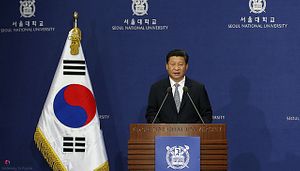With the upcoming APEC economic leaders meeting (AELM) set to start in just two weeks in Beijing, Japan is putting the finishing touches on its full-court charm offensive with its regional partners. As Prime Minister Shinzo Abe seeks to hold sideline meetings with his counterparts from China, South Korea and Russia, the likelihood of each of these mini-summits is a looming question. Each leader represents for Abe a bilateral relationship that Japan is either trying to revitalize or reset, as its closest geographical neighbors have drifted away from Tokyo since Abe took office almost two years ago. Let’s review each meeting in order of the likelihood in which they will happen.
Russia
This meeting is a done deal. Both sides indicated their enthusiasm for a chance to speak on Friday, which they had not done since the Winter Olympics in Sochi, when Abe visited in February. Last week Abe and President Vladimir Putin met in Milan on the sidelines of the Asia-Europe Meeting, and confirmed their commitment to speak again in Beijing. While the two sides are clear in their eagerness to talk, what they will have to say has been less clear. One large topic of interest is likely their energy relationship, as Russia accounts for almost 10 percent of Japan’s LNG imports. While Japan has joined its U.S. and European neighbors in sanctioning Russia for its involvement in the Ukraine crisis, the two could be expected to express their desire not to let European affairs affect their shared interests in Asia, particularly as talks to build a pipeline between Russia’s Sakhalin and Japan’s Hokkaido islands have reemerged.
China
At this point it is still unclear whether or not Abe will be able to meet with Chinese President Xi Jinping, although Japan is certainly doing everything it can to convince Xi to agree. As my colleague Zach noted earlier this month, Japan appears ready to give significant ground to China over the Senkaku/Diaoyu Island dispute in a bid to hold the meeting. Government sources that spoke with the Mainichi newspaper said that Abe would continue to assert that the islands are an inherent part of Japanese territory, but would acknowledge that China also has a case to be made, and that the two countries should strive to find a long-term solution to the problem.
Since then Japanese officials have continued to press China on the issue, with deputy Prime Minister and Finance Minister Taro Aso reiterating the request with Chinese Vice Premier Zhang Gaoli last Wednesday at an APEC finance minister’s meeting in Beijing. Aso cited Japan’s declining investment in China as the main reason why the two leaders should speak, in order to address the situation. Additionally, former Prime Minister Yasuo Fukuda will be visiting Beijing on Tuesday, and will reportedly meet with Xi while he is there. This would be his second meeting with Xi since July, at which time he also brought up the possibility of a meeting. Fukuda will be visiting this week in his capacity as chairman of the Boao Forum for Asia, which brings together business and political leaders to discuss regional issues.
Despite all Japan’s high-level emissaries and concessions, including Abe’s unspoken acknowledgment of the Yasukuni Shrine issue, which he has not revisited since last year, China has given no public indication as to whether Xi will agree to meet with Abe. It could be that Beijing is holding out on the remaining issue of a more formal acceptance and apology from Tokyo for Japan’s colonial past. It would be difficult for Abe to concede that without being able to expect more from the meeting than just a smile and a handshake. Alternatively, Beijing could just be waiting until closer to the actual event, so as not to stir up unnecessary domestic anger from its more nationalist elements.
South Korea
This bilateral meeting is still the least expected of the three Abe would like to hold next month. There has never been a firm indication from any official channel that President Park Geun-hye will commit to even a photo opportunity. South Korea’s reservations are similar to China’s, stemming from Japan’s use of “comfort women” during the Second World War, mainly taken from its conquered territories on the Korean Peninsula, China and the Philippines.
Last Friday, Japan’s former Finance Minister Fukushiro Nukaga brought up the possibility of a meeting with Park, while delivering a letter from Abe to her in his capacity as the chairman of the Japan-Korea Parliamentarian’s Union. The letter expressed the desire to meet, “As there are problems (to solve between the two countries), it is important to hold dialogue frequently.” However, Park replied that “Whenever we held a summit meeting (in the past), our relations worsened after that,” she told Nukaga. “We have to put priority on sincere efforts (to make a summit meeting a success).” Park maintained that Japan “must address the comfort women issue to South Korea’s satisfaction,” and “must take measures to restore their honor,” in reference to the few women who still survive the ordeal.
Abe’s government has shown no indication that it is willing to change its position on this issue, and indeed just over a week ago attempted to have the UN retract part of an old report detailing examples of Japanese abuse. In light of current events, and the Abe administration’s overall attitude toward challenging the history surrounding these women, a summit meeting with Park is unlikely.
































